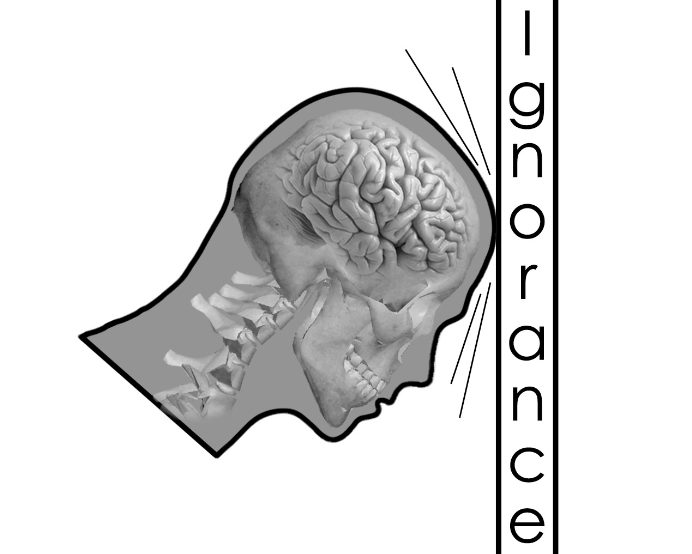The junior still remembers that day in math class. It was the day after she was hit in the head with a bench-press bar during gym class and the day before she was diagnosed with a concussion.
“My head was throbbing, and the numbers were swirling,” said the student, who asked that her name not be shared. “And yet my teacher still kept my score for the test, even though I had a medical excuse, and a ‘moderate’ concussion.”
This student is just one of many who believe they were treated unfairly by teachers when they were concussed. And just as some teachers at Staples and other district schools are apparently hesitant or even unwilling to meet the needs of concussed students, Westport itself seems to show disregard for athletes’ health: it is one of the only districts in Fairfield County that does not mandate important baseline testing for all athletes, designed to help determine when a student who subsequently suffers a concussion is healthy.
Doctors describe healing from a concussion as a slow process. According to Dr. Michael Lee, a pediatrician at Pediatric Healthcare Associates, a concussed individual should stay in a dark room for two days, which is called “cocoon therapy.” The individual can do nothing–no reading, no tv, no computer, little conversation. After two days the patient may start to do activities in 15-minute increments. These activities include soft music, books on tape, TV, and homework read by parents.
Until symptoms–largely headaches–are gone, Dr. Lee said, there absolutely should be no “school, reading, computer, video games, text messaging, hot tubs, socializing, spinning carnival rides, and no chiropractor.” Permanent brain damage is a risk, Lee said.
According to the American Academy of Pediatrics, students should be evaluated by a physician, restricted from physical activity, and only return to normalcy after symptoms resolve, usually in seven to 10 days.
After the first few days of a concussion some students are able to go back to school, but are limited. According to Lee, students should take no more than one test a day, and they should similarly restrict the amount of schoolwork they attempt.
It doesn’t always work that way.
Nick Drbal ’14 has his own concussion horror story. Drbal got a concussion in middle school after being kneed in the back of the head at a friend’s house. He continued to experience problems during the Connecticut Mastery Test.
According to Drbal, he was a student at Coleytown Middle School when then-Assistant Principal Michael Rizzo said state law required he take the tests although Drbal had a letter from doctors saying he was excused. According to Drbal, Rizzo gave him no choice, and he had to go in for every CMT test. Rizzo read the test’s directions to Drbal and reminded him that he could stop when his head began to hurt.
“So right as he finished with directions, since I wasn’t capable of thinking, I just said ‘my head hurts’ and we stopped,” remembered Drbal.
Rizzo said he could not comment on the incident, citing confidentiality.
Although other students reported reactions from teachers or administrators like this, they said even more common is an attitude of disbelief. Jenna Bernard ‘14 got two concussions at the beginning of this year from hitting her headonce wakeboarding and then the same day hitting her head against a door. She was diagnosed with a concussion four days later. Bernard says that many of her teachers made it obvious that they thought she was faking to get out of school-work.
“They would sigh or roll their eyes when I told them I couldn’t do an assignment or when I said that my head hurt.”
Gea Mitas ‘14 got a concussion playing soccer last fall. In a recent interview, she described similar experiences, including one teacher who gave her particular difficulty.
“He was very aggressive about me getting my work in when everyone else did, even though he knew I had a concussion,” said Mitas.
When a student is diagnosed with a concussion, teachers get an email from the nurse or administration with the name of the student and instructions on how to handle the particular situation.
“A couple of years ago teachers got an email with information about head injuries. It’s time for a refresher to get teachers to be more sympathetic,” said Heather Colletti-Houde, an English teacher at Staples.
Colletti-Houde continued to say that though teachers tend to be sympathetic, they are begrudgingly so.
“We err on the side that kids are going to do the right thing,” said Colletti-Houde.
“Good students don’t take it as a vacation. It is a struggle for them,” said an anonymous teacher.
“One of the nurses talked about concussions at a faculty meeting last year or the year before. It was helpful,” said the same anonymous teacher.
Colletti-Houde pointed out that having students with concussions can be overwhelming for teachers as it is on the teachers’ shoulders to help students to be proactive with catching up on work and not getting too behind in classes.
The process of clearing a student can be simplified if the student took a baseline test. That’s where Westport schools’ second problem plays a role: athletes comprise most of the concussed students at the school, and in Westport, don’t get baseline tested.
“Without a baseline test you are comparing yourself to 10 of thousands of normal kids. The reason why athletes need the impact test is because the kids with disabilities or different learning styles have very different results than the average student,” said Dr. Lee.
The baseline test is not the only way to access a concussion according to Dr. Lee. “Fifty percent is symptom-based and the other 50 percent is the ImPACT test. Both have to be 100 percent better before they return to play.”
Mitas never took a baseline test, a pre-injury online impact test that Staples no longer requires. Doctors compare the results of a student’s baseline test to the results of a post-injury exam. This helps doctors determine whether a student should be cleared to go back to normal life, sports and school included.
Mitas did take two post-injury tests, three weeks apart, where her doctor looked for and found signs of improvement. One week after her second test, she was back playing soccer.
“Looking back, I probably should have waited longer before going back to soccer. A baseline test would have been helpful,” said Mitas.
Baseline testing for concussions used to be required for f Staples athletes.
According to Elizabeth Russ, a nurse at Staples, the test is not terribly accurate and is labor intensive.
Gaetana DiLeo, a trainer at Staples, described how difficult it was for trainers to manage their time back when Staples administered their own baseline tests.
“Because it took so much time, it was taking away from my duties down here (in the training room). We also couldn’t clear the students ourselves, they had to go back to the doctor for that,” said DiLeo.
Dan Woog, boys’ soccer coach at Staples, thinks that the baseline test could be easily manipulated. He says that an athlete could fake the test to get a low score. This way, a post-injury exam would show a similar score, allowing the athlete to go back to his or her sport.
Dr. Lee believes he has ways to prevent students from cheating the system. “I know how scores should look, and I know when they don’t look right, because it doesn’t match up. Most kids don’t mess with me on that. Many patients are A and B students who don’t want to miss school. I could count on one hand the amount of students that malinger.”
Ali Thomson ’14, also a student at Staples, has had four concussions in her life. She did not have a baseline test prior to her first concussion. However, when she was cleared from that concussion she took a baseline test that she would later use for the next three concussions.
The effect was simple, she said, and it lasted through all her other concussions.
“It helped me figure out when I was recovered.”














































